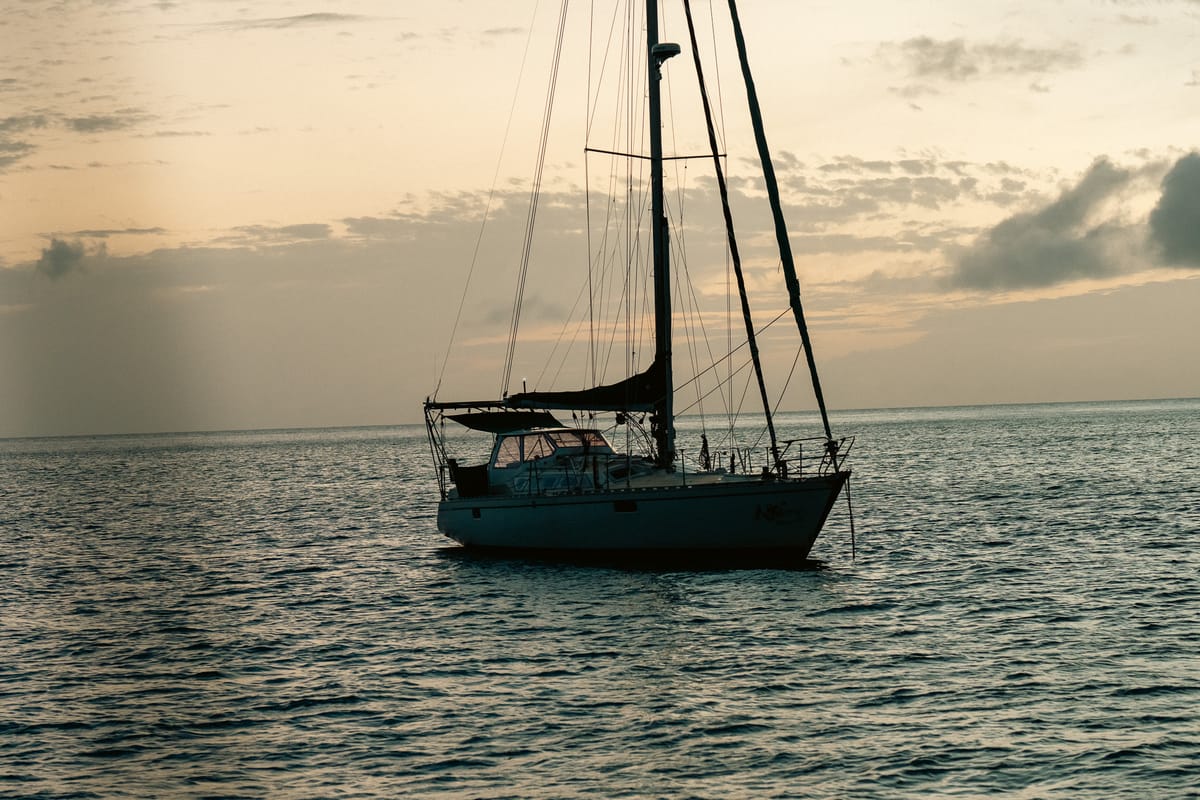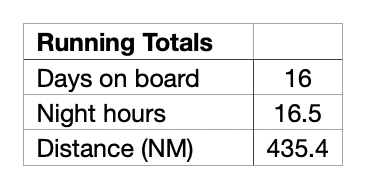Diamond Rock

I don’t have a picture of Diamond Rock, I was on the helm. From the east it looked like a large grassy helmet that had rolled away from the main body of Martinique and come to rest on the sea, but as we sailed across its north you could see long eyes either side of a nose and so I saw a skull. I wanted to take a photograph but I was busy at the wheel and then thought how restful it was that I could not, I was experiencing the rock like many had before we had cameras, who had sailed here? What had they thought? Seen in the rock? I could only look at it sitting still there looking at me, after passing could look over my shoulder at its western side, birds flying across the nose. We sailed all day and all night in shifts, and I did not take photographs of the seabird that flew circles around the boat and dived for fish, not the sun as it neared the horizon to the west and shone through a cloud formation making a golden halo on the sea, nor the long lit Dominican coastline in the night. It smelt like a fire. I was tired. The wind in my face kept me awake. The stars were indescribable, my betters had tried to contain them in words and failed, they were everywhere, and how long had that soft North Star guided us, I lost Dominica to the south and saw the sunrise over Guadeloupe and waved at the fishermen. All these things I saw. I told myself to remember them so I could write about them later and when I came to found they had all stayed.
For me this crossing was about gaining experience. There were decades of sailing in James. Joel had spent most his military career sailing. And Peter had lots of experience too. I was the junior. I enjoyed being on the wheel, needed to get better at taking down the sails, wanted to know about the engine, there was much to learn and it would take its time. As a young man I'd rushed things which had not worked. I learned patience working in a restaurant in my thirties. I'd never been a reader and fortunately met the writer Francis Spufford who bought me my first book, Dispatches, on the Vietnam war, where Michael Herr writes,
'You could fly up and into hot tropic sunsets that would change the way you thought about light forever.'
I could not stop reading after that, getting through hundreds of books, writing late into nights after work. It took four years but I got somewhere. I now knew there wasn't a thing I'd gained easily that had held much value. I wanted to know the sea, boats, lines, anchors, weather, all of it and all of it would take time and for that I was glad because it felt true.
This was the longest sail we had done on this trip, covering 115 nautical miles and a further 22 to another anchorage. I'd started the year with 79NM and now had over 400NM of experience. We had not started heading to Bermuda yet, which would be around 900NM from Antigua, from Bermuda to the Azores around 1700NM and from there to the UK around 1200NM. There was more to come.
Logbook:

Between the sailing I read. I had brought along a copy of Bernard Moitessier's The Long Way documenting the race where Sir Robin Knox-Johnston became the first to complete a solo non-stop circumnavigation of the globe, Moitessier nearing the finishing line instead turned away and kept sailing,
"I spend long moments on deck, watching the flecks of foam rising in the wake. There are so many things in the flecks of foam and the water that runs along the side. I could not ask for more; I have it all.…one day gracefully makes way for the next. I have only been gone a month; my boat and I could have been sailing forever. Time stopped long ago, I have the feeling nothing will ever change; the sea will stay the same luminous blue, the wind will never die."
We are now heading to Antigua and then making the push for Bermuda. There may be a week I cannot post but I'll get back to writing as soon as I can.
Until the next time thank you for reading and please share this post with friends,
Adnan
Deshaies anchorage, Guadeloupe, 2025
Adnan Sarwar is a philosophy student at the University of Oxford and a fellow of the Royal Geographical Society. He won The Bodley Head/Financial Times essay prize, edited for The Economist and is an Iraq war veteran of the British Army.
References
Herr, M. (1991) Dispatches. United States: Picador
Moitessier, B. (1995) The Long Way. New York: Sheridan House